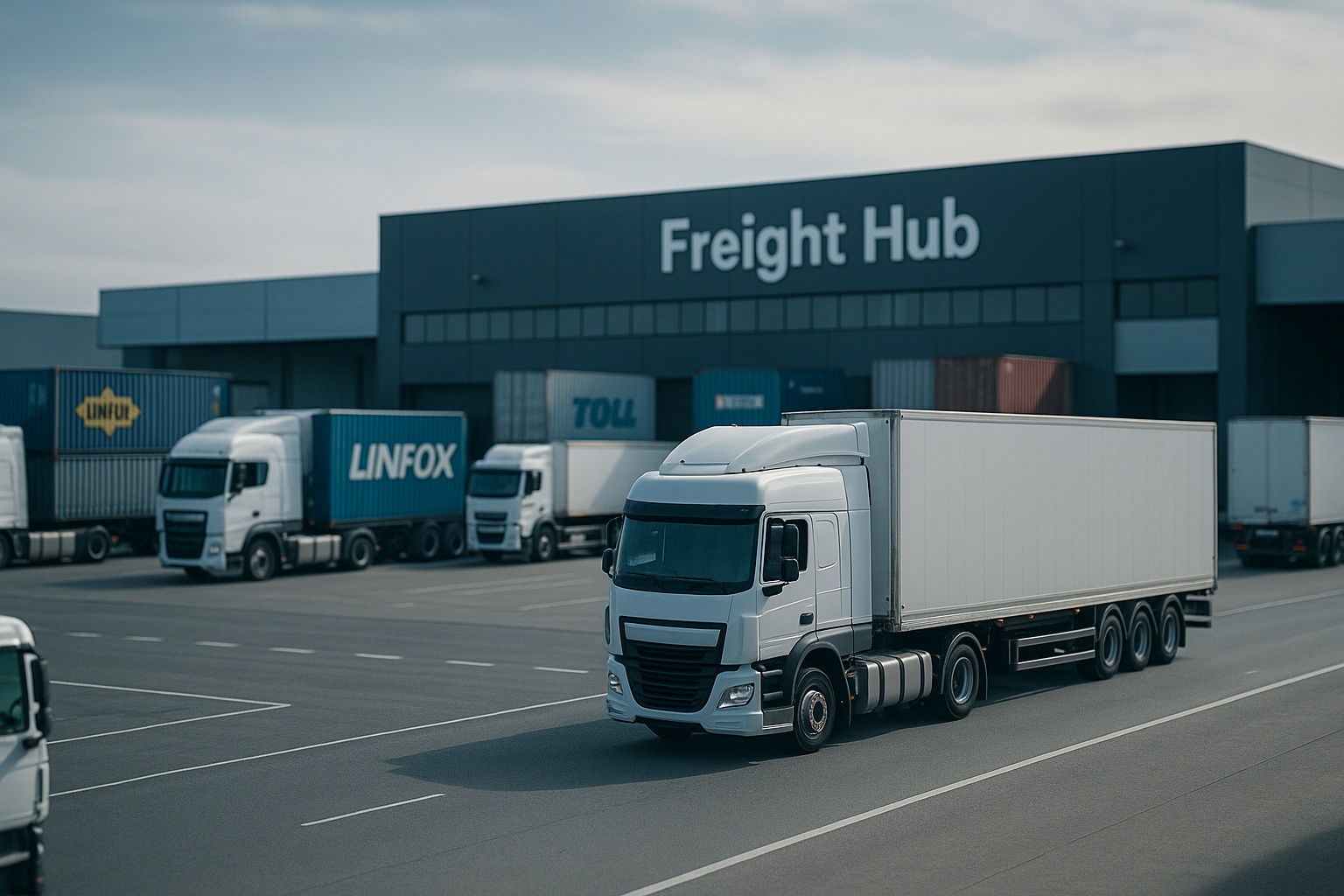How To Choose The Best Freight Partner For Your Business?
Selecting the right freight partner for your business is more than just about choosing someone to deliver your goods. It’s about finding a strategic partner who can enhance your supply chain, save you money, and help you scale your operations smoothly. Whether you’re shipping locally or globally, your freight partner needs to be someone you can rely on to meet tight deadlines, keep costs in check, and adapt to your unique needs.
As a business owner in Australia, navigating the world of freight can be overwhelming, but with the right knowledge and approach, you can find a partner that will set your business up for success. It’s a decision that requires careful thought, balancing reliability with cost-effectiveness, and ensuring that your partner aligns with your long-term goals.
Platforms like Cario help simplify this process by giving Australian businesses a single, connected view of their freight operations, carriers, and costs—making it easier to choose and manage the right freight partners. Let’s dive into the key factors that will guide your choice.
If you’re looking to strengthen your broader logistics strategy, you may also find our guide on successful freight management helpful: https://cario.com.au/resources/our-guide-to-successful-freight-management

Let's Get Straight To The Point
Choosing the right freight partner is essential for business success. It involves evaluating factors like reliability, cost-efficiency, communication, and industry expertise. Your partner should offer real-time tracking, scalability, and the ability to manage risks while complying with regulations. Flexibility in contracts and alignment with sustainability goals are also key. By carefully assessing these factors and ensuring transparency, you can build a strong, cost-effective, and long-term partnership that supports your business growth.
Why Your Freight Partner Matters For Business Success?
When I first started out in business, the choice of freight partner was almost an afterthought. Like many, I simply went for the cheapest option, thinking it would be enough to get my products from point A to point B. But soon enough, I was facing delayed shipments, damaged goods, and frustrated customers. It quickly became clear: a freight partner isn’t just a logistics provider — they’re a vital cog in the wheel of your business success.
Freight partners can make or break your reputation. One missed delivery can cost you more than just money — it can cost you customers. On the flip side, a reliable partner can ensure that your goods arrive on time, undamaged, and ready for your customers to enjoy.
The Role Of Freight Partnerships In Modern Business
In today’s fast-paced world, customers expect fast, reliable service. Whether you’re shipping internationally or across town, your freight partner is the bridge between your business and your customer. It’s more than just moving goods — it’s about building trust with your clientele. This means that choosing a partner who offers more than just transportation is essential. You need someone who can handle unexpected issues, meet your fluctuating needs, and ultimately help your business grow.
Take, for example, a local Sydney bakery I worked with. They started small, but as demand for their artisanal pastries grew, they needed a partner who could help them get their goods to markets across New South Wales. By choosing a freight provider that understood the intricacies of the food industry — including temperature controls and timely delivery — they were able to expand without worrying about their logistics. Their partner became an extension of their business, helping them stay on track during peak seasons and growing with them every step of the way.
How The Right Freight Partner Contributes To Cost-Effectiveness?
A freight partner who understands your business can offer more than just a service — they can offer cost-saving solutions. The right partner will help you optimise your routes, take advantage of economies of scale, and even advise you on better packing methods to reduce shipping costs. But this doesn’t mean choosing the cheapest option. Often, the lowest price comes with hidden costs — poor reliability, longer delivery times, or lack of flexibility — that can hurt your business in the long run.
For example, when I worked with a startup importing electronic goods, they initially went with a low-cost provider. However, their freight partner often had delays at the port, leading to missed sales opportunities. We ended up switching to a slightly more expensive partner, but one with better communication and faster processing times, which in turn boosted sales and customer satisfaction.
Core Factors To Consider When Selecting A Freight Partner
Now that we’ve laid the groundwork, let’s dive into the critical factors that should guide your selection. There are several things you’ll want to assess to ensure you’re choosing the best fit for your business.
Reliability And Track Record
You wouldn’t trust your business to someone with a poor track record, so why would you choose a freight partner without verifying their reliability? When I first started working with a freight partner, I was initially drawn in by their low costs. But it didn’t take long to realise that cheap doesn’t always mean good value. Missed deadlines and poor communication started to hurt my business.
Reliability is one of the most important factors in your decision. Look at a provider’s history — do they have a strong on-time delivery record? Have they had customer complaints or issues with damaged goods? Ask for references and read reviews, particularly from businesses similar to yours. It’s also a good idea to request their performance metrics — many reputable partners will be transparent about their delivery rates and service history.
Industry Expertise
Every industry has its quirks. What works for one business might not work for yours. That’s why choosing a partner with specific expertise in your industry is essential. Whether you’re in retail, food services, or manufacturing, your freight partner should understand the unique challenges your business faces. For example, perishables need to be delivered faster and under temperature-controlled conditions, while bulky industrial goods require careful handling.
I once worked with a company that specialised in shipping construction materials across the state. Their freight partner had specific expertise in heavy-duty shipments and had the right equipment to handle their oversized loads. As a result, deliveries were smoother, and the risk of damage was greatly reduced.
Scalability And Flexibility
As your business grows, your logistics needs will evolve. The right freight partner should be able to grow with you, adapting to your changing demands. When selecting a partner, it’s important to assess their scalability. Can they handle your growing volume? Do they have the flexibility to adjust to changes in your schedule or product demand?
For example, a company I worked with expanded into the international market. Their existing freight partner was local and lacked the infrastructure for international shipping. By switching to a provider with global reach, they were able to continue their growth seamlessly, handling everything from customs clearance to international regulations without hiccups.
Reliability And Track Record
Assessing the partner’s performance metrics, including on-time delivery rates and damage percentages, is crucial. A reliable freight partner ensures smooth operations and maintains a good reputation with your customers. The risk of choosing a partner with a poor track record could result in operational delays, increased costs, and ultimately lost customers.
Financial, Cost, And Procurement Considerations
One of the most critical factors when choosing a freight partner is cost. As much as reliability and service are important, at the end of the day, every business needs to keep an eye on the bottom line. However, it's essential to understand that selecting the cheapest option doesn't always translate to the best value.
Cost Efficiency
When looking at freight costs, it’s not just about the rate you’re quoted upfront. A reliable partner can save you money in the long term through cost-saving strategies like optimising your routes and consolidating shipments. For example, a local retailer I worked with initially went with a cheap freight provider, but the hidden costs of damaged goods and late deliveries meant customers weren’t happy. After switching to a provider with better infrastructure, the business saw a reduction in customer complaints, and the overall cost of delivery became more predictable.
A partner that has access to a large carrier network can often offer better rates by leveraging economies of scale. The more shipments they handle, the better their ability to negotiate with carriers, passing on those savings to you.
Understanding Cost Drivers
Several factors, including distance, cargo weight, volume, and the mode of transport, influence freight costs. All these factors contribute to the overall cost structure. One of the most significant cost drivers is the fuel price. For example, in remote parts of Australia, fuel costs can fluctuate due to changes in global oil prices, and this can significantly impact your freight budget. It’s important to factor this into any long-term contracts you negotiate.
When you understand how these costs break down, you can work with your freight partner to optimise your operations. For instance, consolidating shipments or adjusting your delivery schedules to avoid peak periods can reduce your shipping expenses.
Quote Negotiation
Negotiating a freight quote is an art. The key here is preparation. I always advise businesses to fully understand their shipping volumes, the potential discounts they may qualify for, and the various accessorial charges (like fuel surcharges or handling fees) that may apply. The more you know about your shipping patterns and your partner’s pricing structure, the better equipped you are to negotiate favourable terms.
For example, a supplier I worked with recently reduced their annual shipping costs by 15% simply by consolidating shipments and leveraging a tiered discount structure. It wasn’t about finding the cheapest rate — it was about negotiating based on their specific needs and shipment volume.
Incoterms And Quote Normalisation
For businesses involved in international shipping, understanding Incoterms is crucial. Incoterms like EXW (Ex Works), FOB (Free On Board), or DDP (Delivered Duty Paid) determine who’s responsible for what during transit, from the cost of freight to customs clearance. A critical mistake businesses make is comparing international quotes that use different Incoterms without normalising them.
For example, if one quote is based on EXW, the buyer is responsible for transport costs and customs duties, while a DDP quote includes these charges. To compare accurately, ensure you normalise all costs, including main carriage, destination port handling, cargo insurance, and customs brokerage. This will give you a clearer picture of which partner offers the best value.

Technology And Data Capabilities
In today’s fast-paced business environment, technology is a game-changer in logistics. If your freight partner isn't leveraging advanced technology, you could be missing out on efficiency gains, real-time tracking, and the ability to resolve issues before they become major problems.
Real-Time Tracking And Visibility
The ability to track your shipments in real-time is no longer a luxury — it’s a necessity. For businesses, especially those with time-sensitive deliveries, real-time tracking is a crucial element in ensuring goods are where they should be, when they should be. As a business owner, I learned the hard way that relying on traditional, manual check-in methods was inefficient and prone to mistakes.
I worked with a company in Melbourne that had been using a freight provider without advanced tracking. Shipments were constantly delayed, and we couldn’t get accurate updates. When we switched to a partner who offered GPS tracking, we were able to get immediate visibility into the location of our shipments and proactively address issues before they escalated. The improved communication with both the customer and the partner significantly boosted our service quality.
Intelligent Systems
The logistics industry is undergoing a technological revolution, and freight partners are increasingly using Artificial Intelligence (AI) and machine learning to optimise their operations. Transport Management Systems (TMS) and Warehouse Management Systems (WMS) are helping partners make smarter decisions by improving route planning, automating documentation, and predicting demand surges.
For instance, a client I helped in Sydney used a partner with a TMS that optimised their routes based on real-time traffic and weather data. This led to a 20% improvement in delivery times and a reduction in fuel consumption, all while maintaining the same level of service.
Blockchain For Transparency
Emerging technologies like blockchain are also finding their way into the freight sector, helping ensure secure and transparent transactions. Blockchain offers a distributed ledger that can track every movement of goods across the supply chain, creating an immutable record. For businesses dealing with high-value or sensitive items, this kind of transparency can be invaluable in building trust with customers and partners alike.
Risk Management And Compliance
Freight isn’t without its risks — from weather disruptions to regulatory changes, a lot can go wrong. That’s why your freight partner must not only be prepared to manage these risks but also be compliant with local and international laws.
Supply Chain Resilience
Australia’s vast size and diverse climate make for unique challenges when it comes to logistics. From bushfires in the summer to flooding in the wet season, unexpected disruptions can cause massive delays. That’s why working with a partner who has a well-thought-out contingency plan is essential.
For example, a farm in Queensland I worked with faced challenges with transport due to floodwaters. Their partner had an extensive network of routes and backup carriers, allowing them to reroute shipments quickly. This ensured that the produce reached its destination with minimal delay, despite adverse weather conditions.
Regulatory Compliance
Australia’s freight industry is heavily regulated, and businesses must ensure their freight partner adheres to all necessary laws and guidelines. The Heavy Vehicle National Law (HVNL) and Chain of Responsibility (CoR) are examples of regulations that freight providers must follow to ensure safe and legal transport practices.
A logistics provider I collaborated with in Brisbane regularly updated their compliance practices and trained their team to meet the CoR requirements, which ensured that we avoided any legal issues. By selecting a partner that stays on top of industry regulations, you can minimise risks related to fines and other compliance issues.
Insurance
Every freight transaction carries risk, and ensuring your goods are covered with adequate insurance is essential. Before entering into an agreement, it’s important to verify that your freight partner carries sufficient liability coverage. Reviewing the insurance terms and scope of coverage can prevent nasty surprises should anything go wrong during transit.
How To Evaluate Customer Service And Communication In Freight Partners?
An often overlooked but crucial factor in selecting a freight partner is customer service. Poor communication can lead to confusion, missed deadlines, and damaged business relationships. On the other hand, a partner with excellent customer support can make your life much easier, providing timely updates and quick resolutions to any issues that arise.
Customer Support And Proactive Communication
One of the biggest frustrations I’ve encountered in the past was with a partner who didn’t communicate proactively. The lack of updates meant I was left in the dark about delivery statuses, and when problems arose, I only found out when it was too late to address them.
The ideal freight partner should offer dedicated account management, ensuring a single point of contact who is familiar with your business needs and can keep you updated on shipments. This individual should be available at all times to respond quickly to any queries or concerns. It’s essential that your partner is proactive in communicating delays, issues, or changes and provides you with solutions instead of just leaving you to figure things out.
Transparency And Reporting: Building Trust With Your Freight Partner
Transparency in freight partnerships is a must. You need a partner who provides clear reporting on all aspects of the logistics process. This includes real-time tracking of shipments, delivery windows, and even performance metrics like on-time delivery rates or the number of damaged goods. A transparent partner will ensure you’re never left guessing about where your goods are or when they’ll arrive.
For example, a company I worked with in Melbourne required detailed reports on each shipment's status, including delivery delays and issues with specific carriers. Their partner provided daily updates and offered actionable insights for future shipments, which allowed the business to adapt and improve its shipping processes over time.
Key Customer Service and Communication Factors:
Factor | What to Look For |
Dedicated Account Management | A direct point of contact who understands your business and can address issues. |
Proactive Updates | Regular updates, especially during disruptions, to keep you informed. |
Availability | A partner who is available to respond quickly to questions or problems. |
Clear Reporting | Access to performance metrics, real-time tracking, and delivery information. |
How To Negotiate Contracts And Build A Strong Freight Partnership?
Now that we’ve covered the operational and customer service aspects, it’s time to focus on the financial side of things. Negotiating a good contract and building a strong, lasting partnership is essential to making sure your logistics operations run smoothly without unexpected costs.
Quote Negotiation And Cost Drivers
The negotiation process with your freight partner will likely involve discussing various cost drivers like cargo weight, distance, fuel surcharges, and handling fees. One thing I’ve learned over the years is the importance of understanding the full breakdown of the costs before signing any contract. Always ask for a detailed quote that includes all potential charges, including those for special services such as expedited shipping, customs fees, and accessorial charges.
Additionally, many freight providers offer discount tiers based on your volume. The more shipments you send, the better rates you can negotiate. Don’t be afraid to bring this up during negotiations. By increasing your shipment volume or consolidating shipments with your partner, you may be able to access better pricing structures.
Incoterms And Quote Normalisation
If you’re working with international shipments, understanding Incoterms (International Commercial Terms) is key to comparing quotes accurately. These terms define who is responsible for the costs and risks during the transit process. For example, FOB (Free On Board) means that the buyer is responsible for costs after the goods are loaded on the ship, while DDP (Delivered Duty Paid) means the seller covers all costs up to delivery.
Here’s a quick breakdown of the common Incoterms you might encounter in international shipments:
Incoterm | Seller’s Responsibility | Buyer’s Responsibility |
EXW (Ex Works) | Goods are made available at the seller’s premises. | Buyer is responsible for all transport, duties, and risks. |
FOB (Free On Board) | Seller covers transport to the ship and loading. | Buyer handles transport from port and all related costs. |
DDP (Delivered Duty Paid) | Seller covers all costs, including shipping, duties, and taxes. | Buyer receives goods at the specified destination. |
When negotiating international contracts, it’s vital to normalise all quotes to a “to-door” total — meaning the full cost of getting goods from the seller to your door. This ensures you can compare providers on equal terms.
Contract Duration And Flexibility: Balancing Stability And Growth
Long-term contracts can provide stability, but they can also tie you down if your business needs change. When negotiating, ensure that the contract allows for flexibility to adjust terms or scale up your operations without penalty. For example, a supplier I worked with in Brisbane locked into a long-term contract without a flexibility clause, and when they needed to ramp up shipments due to seasonal demand, they faced hefty charges for breaking the terms.
It’s essential to assess how long you’re willing to commit and whether the partner can offer adjustments if your business grows or shrinks in volume.

The Role Of Reviews And Testimonials In Choosing Your Partner
It’s always wise to vet potential freight partners through reviews and testimonials. Don’t just rely on what the freight company says about themselves — seek out unbiased opinions from their current or past clients. If possible, reach out to businesses in your industry to ask about their experiences with the provider. Customer feedback often provides valuable insight into how a partner operates under real-world conditions.
In the end, choosing the right freight partner is a decision that will directly affect your business's efficiency, profitability, and growth potential. The right partner isn’t just a service provider — they’re an extension of your team, helping you scale, reduce costs, and deliver quality service to your customers.
To recap, the key factors to consider include:
Reliability and track record: Ensure your partner can consistently meet deadlines and maintain quality.
Customer service and communication: Look for a partner who is proactive and transparent.
Technology and data capabilities: Choose a partner who can offer real-time tracking and integrate with your systems.
Cost-efficiency: Understand all the cost drivers and negotiate for the best value, not just the cheapest price.
Sustainability and compliance: Consider the partner’s environmental impact and ensure they meet all regulatory requirements.
By thoroughly evaluating these criteria, you can confidently choose a freight partner who will not only meet your logistical needs but also align with your business values and long-term goals.
Frequently Asked Questions
How Do I Assess The Reliability Of A Freight Partner?
Look for a track record of on-time deliveries, low damage rates, and positive customer reviews. Ask for performance metrics and references from similar businesses to ensure they can meet your specific needs.
What Technology Should I Expect From A Freight Partner?
The right partner should offer real-time tracking tools, advanced Transport Management Systems (TMS), and AI-powered systems for route optimisation and demand forecasting. Blockchain technology for secure and transparent transactions is becoming increasingly valuable.
How Do I Negotiate Freight Costs Effectively?
Start by understanding the cost drivers like distance, cargo weight, and fuel surcharges. Be prepared to negotiate based on volume discounts and ensure you normalise quotes to a “to-door” total, especially for international shipments.
Why Is Customer Service Important In Freight Partnerships?
Effective communication is key to resolving issues quickly. A dedicated account manager and proactive updates help prevent delays and ensure smooth operations. Choose a partner that responds promptly and keeps you informed about any disruptions.
How Can I Ensure My Freight Partner Aligns With My Sustainability Goals?
Choose a partner who demonstrates a commitment to reducing CO2 emissions and offers green alternatives like electric vehicles or rail transport. Ask for regular emissions reports and ensure their practices align with international sustainability standards.


